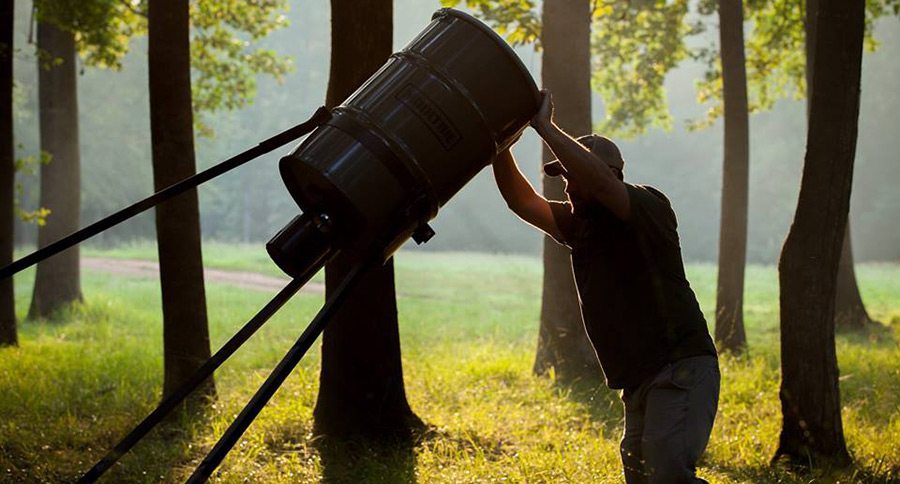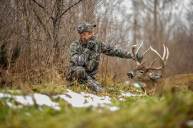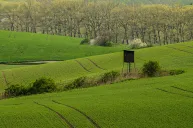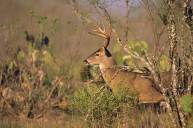There's a lot involved in game management, but feeding is high on the list for many across the country.
Every hunter, especially those who chase whitetail and do it seriously, knows that managing their land and the game on it can make a true difference in year over year success.
Sometimes it takes longer than they'd like, but the smart ones know that doing everything they can to adapt and alter their land to a better place for game animals, the better off they'll be on Opening Day.
There's a lot of forms that game management takes, but feeding deer, be it with food plots, native plants, whole kernel corn, or mineral supplements, can really turn things in a positive direction.
Feeding should be a choice every landowner and game manager makes on their own, within the regulations set forth in their area. There are places, like Texas, that acknowledge and allow the advantage a feeder can provide. In some states, like Montana, supplemental and artificial feeding is presented as "dangerous." Make sure you're following the laws and ethics first and foremost.
But when feeding does become part of what you consider on your hunting property, what sort of things could persuade you? We figured we could provide you with some of the biggest reasons, and let you make the call from there.
Year round benefits
If you're feeding deer on a regular basis, every month out of the year, imagine the imprint you're placing on those animals. They're going to know, when push comes to shove and food becomes scarce, there will always be a source in this one spot.
Being at that one spot once hunting season begins is up to you, but reason number one (and maybe the most obvious) includes the fact that deer will flat out stick around.
As far as deer monitoring and pattering goes, good plots often drive the storyline. Adding a trail cam into the mix, placed strategically near your food sources, will allow you to take stock of the herd, make basic measurements and analysis, and even determine the health needs that the deer on your property might exhibit.
Feeders give you a pinpoint spot that you know deer will be coming to, so putting a camera on your feeders through the whole offseason is a great way to take inventory of the animals on your property.
Of course, feeding helps attract more deer to your property to begin with, which can set you up for the season nicely. Plus, you don't have to worry about drought, freezes, fertilizer, soil condition, or other uncontrollable factors; the deer know there is a consistent food source in that particular spot no matter the weather conditions or time of year.
You're maintaining control over at least one consistent food source, and they're going to remember that. The strategy behind providing and locating feeders becomes far more important (and fun), so you're improving the hunting odds throughout the land you manage.
Full reliability
In the past, using an "auto-feeder" meant that sometimes your deer would get fed, but other times a malfunction or dead battery ruined a perfectly good opportunity. Heck, before that, hunters spread corn by hand or with a wheel barrel. Trust us, that stage is over with.
Nowadays, technology allows a system like Moultrie's Pro Hunter Deer Feeder to be nearly foolproof. A digital timer that's fully programmable to engage six times a day, for a wide range of time periods, makes it a cinch to use.
Then look at the simplicity of a Moultrie Feed Station Gravity Feeder, which will gives you the option to feed deer a variety of foods, on demand, in an easy-to-install and maintain way. If you're the type who doesn't want to deal with programming and timing an automatic feeder, it's good to know there are other choices. The Dinner Plate Feeder makes a lot of sense for no-nonsense types, too. They're free choice feeders that let the deer eat when they want.
It's important to remember that as long as you seek out high quality stuff, today's feeders are durable, varmint-protected, and ready to provide dependability for years and years.
Learn your land, and how deer use it
There's really no better way to gain an appreciation, and a far better understanding, of the land you're hunting than working it. This is especially pertinent if you're going big and clearing land on a larger scale.
Planting food plots, spreading large areas, and even weed control can give you a better sense of how things grow, what happens in a planting cycle, and how the game animals react throughout an entire year.
Beyond natural and planted sources of food, deer can come to rely on your supply. Specific feeders can be used, in essence, to control the deer and influence their behaviors.
Most states do not allow you to hunt over a feeder, but many do allow them to remain up during the season as long as you are hunting a minimum distance away. If that is the case for your state, you can still use them to your advantage during season. If you work towards establishing their patterns to and from the feeder, you can pretty easily narrow down a kill spot along that path that's well within the legal distance and follows any other set laws from your area.
Give them what they need
Consider this: Where it's legal, the advantage of mineral site usage can be huge. Where's the proof? Antler development and weight gain can be positively influenced with the best supplements out there, and creating these consistent sources of phosphorus and calcium, plus various essential vitamins, is a scientific way to promote better overall herd health, but also antler growth.
If you know what your deer are eating, you'll know what specific supplements to add, and can
Feeding shouldn't be shunned as a way to influence the deer herd you're hunting. Even though it takes hard work, dedication, and a heck of a lot of effort, doing it the right way can make a real difference.
NEXT: 3 WAYS MOULTRIE MOBILE WILL CHANGE THE WAY YOU USE TRAIL CAMS




